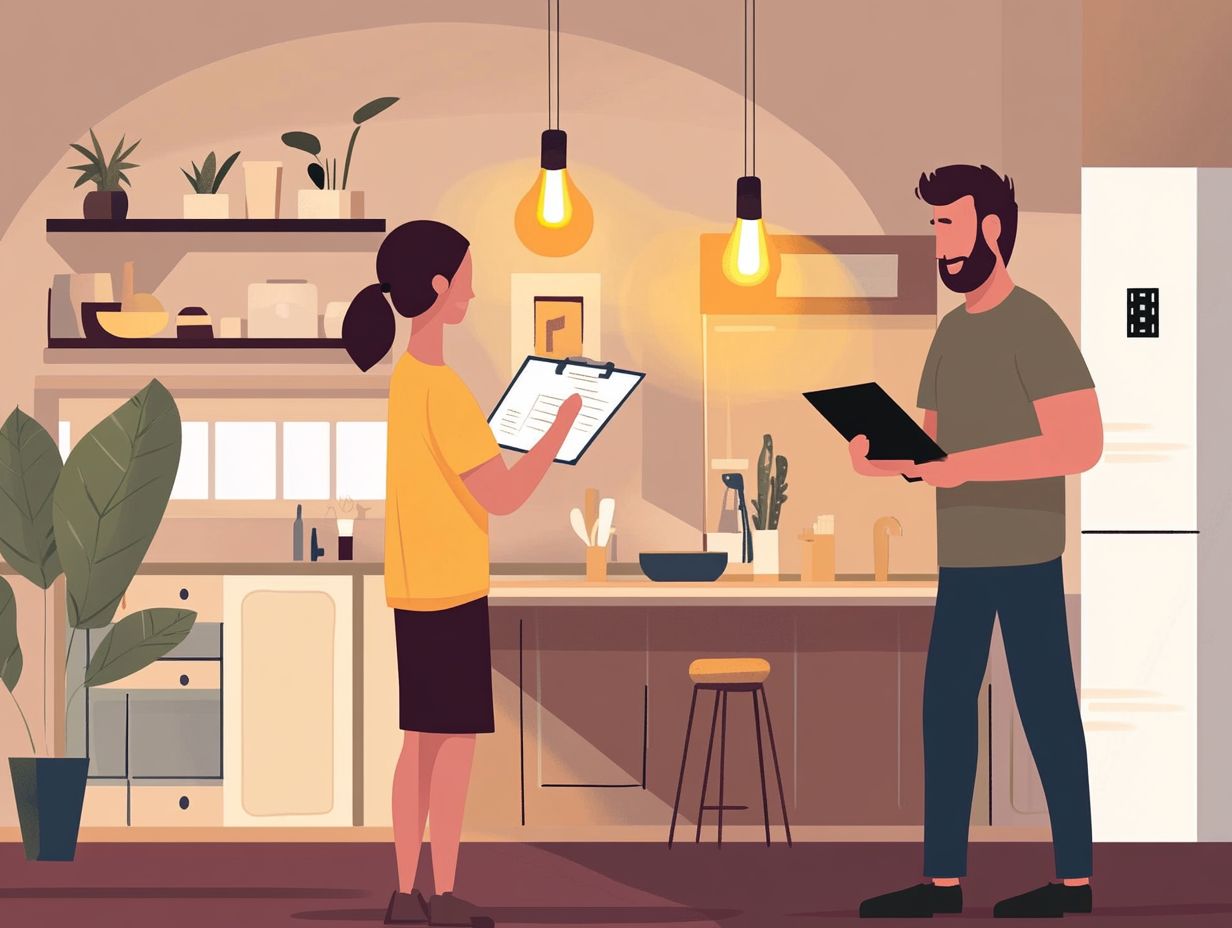Are you interested in reducing your energy bills while improving the efficiency of your home? An energy audit could be just what you need.
This process allows you to identify areas where energy waste is being wasted and offers practical steps to enhance your home’s energy performance.
From grasping the fundamentals of an energy audit to recognizing common energy hogs and implementing effective energy reduction strategies, this guide will take you through each stage of the process.
Learn how professional auditors can assist you in transforming your energy consumption today!
What is an Energy Audit?

An energy audit serves as a thorough evaluation of a home's energy consumption, aimed at identifying opportunities for improvement and enhancing overall energy efficiency.
This assessment considers several factors, such as insulation, HVAC systems, appliances, and the building envelope, to analyze how energy is being utilized within the home.
By employing various diagnostic tools and methods, homeowners can gain a clearer understanding of their energy footprint. This insight can lead to effective energy management strategies and potential cost savings on utility bills.
Explanation and Benefits
Understanding the benefits of an energy audit is essential for homeowners aiming to lower their energy bills and enhance overall home comfort. An energy audit identifies energy inefficiencies and excessive usage within the home, offering valuable insights that can lead to substantial savings through targeted energy efficiency upgrades.
This process not only highlights areas where energy conservation can be achieved but also provides access to potential utility incentives for energy-efficient renovations. Homeowners may be surprised to discover that simple adjustments, such as sealing drafts or upgrading insulation, can significantly lower monthly expenses and reduce their home's carbon footprint.
These improvements not only enhance comfort but also have a positive impact on the environment, making energy audits a beneficial choice for both financial savings and sustainability.
Preparing for an Energy Audit
Preparing for an energy audit requires gathering important information about your home's energy usage habits and consumption patterns. This preparation can significantly streamline the energy audit process.
By being well-prepared, homeowners can effectively provide auditors with relevant data, such as utility bills, details from past energy audits, and information about any existing energy-efficient upgrades that have already been implemented.
Gathering Necessary Information

Gathering the necessary information is a crucial step in preparing for an energy audit, as it provides auditors with the essential data needed to analyze your home's energy performance effectively. Homeowners should compile recent utility bills, energy rates, and any previous home inspection reports to create a comprehensive overview of their energy usage.
It is important to document details such as appliance efficiency ratings, insulation levels, and specifications for heating or cooling systems. This information is vital in identifying potential areas for improvement and uncovering energy-saving opportunities that can lead to reduced energy costs.
Additionally, having information about past renovations or energy upgrades can demonstrate the effectiveness of previous efforts. The resulting energy performance certificate, derived from this thorough assessment, not only enhances the property's value but also offers actionable insights that can encourage more sustainable living practices.
Conducting the Audit
Conducting an energy audit is a systematic process that entails a careful examination of your home, focusing on different factors that impact energy performance. This process unfolds step by step, incorporating visual inspections and diagnostic tests designed to pinpoint inefficiencies.
These may include issues like air leaks, the types of insulation used, and the performance of HVAC systems. Addressing these elements is essential for enhancing overall energy efficiency.
Step-by-Step Process
The step-by-step process of conducting an energy audit typically begins with a thorough walkthrough of the residence to identify areas where energy may be lost or used inefficiently. During this phase, professionals utilize diagnostic tools such as thermal imaging and a blower door test to evaluate the effectiveness of insulation and to identify air leaks within the building envelope.
After completing this initial assessment, energy experts often discuss specific upgrades for energy-efficient windows and insulation that could significantly reduce overall energy consumption.
Once the walkthrough is finished, energy monitoring devices may be employed to observe usage patterns, offering valuable insights into which appliances or systems are consuming the most energy.
The auditor will also review the home’s energy rating, providing homeowners with a clear understanding of their current performance and potential areas for improvement.
Finally, a detailed report is prepared, summarizing the findings, recommendations, and potential cost savings. This report give the power tos homeowners to take informed, actionable steps toward achieving a more energy-efficient lifestyle.
Identifying Energy Hogs

Identifying energy hogs in your home is crucial for optimizing energy consumption and enhancing energy efficiency. Common offenders often include outdated appliances, inefficient HVAC systems, and poorly insulated areas.
Each of these factors can significantly affect your utility bills and overall energy footprint. By addressing these issues, you can make meaningful strides toward a more efficient and cost-effective home, especially by using energy-efficient appliances.
Common Culprits and How to Address Them
High energy consumption is often attributed to several common factors, including outdated appliances, poor insulation, and inefficient HVAC systems, all of which can lead to a larger carbon footprint. Homeowners can take proactive steps to address these energy concerns by considering energy-efficient renovations, such as upgrading to Energy Star-rated appliances and enhancing their home insulation.
Implementing energy conservation strategies can greatly reduce dependence on traditional energy sources. A good starting point for homeowners is to conduct a comprehensive energy audit to identify specific areas where energy is being wasted. Many utility companies even offer funding for energy audits to facilitate this process.
Once inefficiencies are identified, investing in smart thermostats and sealing air leaks can significantly improve HVAC performance. Additionally, participating in utility efficiency programs can provide rebates for those looking to replace outdated systems. This not only incentivizes energy-efficient practices but also promotes a more sustainable lifestyle.
Lowering Your Energy Bills
Lowering energy bills is an important goal for many homeowners, and implementing effective energy-saving measures is essential to achieving this objective.
By gaining an understanding of your home's energy performance and utilizing an energy savings plan, you can pinpoint areas for improvement. This approach can lead to significant cost reduction over time.
Implementing Energy-Saving Measures

Implementing energy-saving measures is crucial for homeowners who wish to reduce energy costs while improving overall comfort in their residences. Options such as installing programmable thermostats, utilizing energy-efficient lighting, and upgrading insulation can lead to significant enhancements in energy efficiency and lower utility bills.
Additionally, investing in energy-efficient windows can significantly reduce heat loss during winter and minimize unwanted heat gain in summer. This not only contributes to a more stable indoor temperature but also helps lower heating and cooling expenses.
Homeowners can further benefit from integrating energy management systems, which allow them to monitor and optimize their energy usage effectively. These systems provide real-time insights into energy performance, enabling residents to make informed decisions that promote sustainability.
By combining these various measures, homeowners can achieve substantial savings over time, fostering not only financial benefits but also a positive impact on the environment.
The Role of Professional Energy Auditors
The role of professional energy auditors is essential in performing comprehensive energy assessments and pinpointing opportunities for energy efficiency enhancements.
Homeowners should think about hiring a professional when they seek a deeper understanding of their energy performance or when previous DIY assessments have not produced satisfactory outcomes.
When to Hire a Professional
Knowing when to hire a professional for an energy audit can significantly enhance the effectiveness of energy-saving efforts. If a home presents unique energy challenges or if there is uncertainty about interpreting energy assessments, a professional can provide specialized knowledge and tools to effectively identify and address energy inefficiencies.
In situations such as preparing for energy-efficient renovations or aiming to improve overall energy awareness within the household, consulting an expert becomes invaluable. These professionals not only assess current energy usage but also recommend tailored strategies for energy optimization that align with specific needs.
If unusually high utility bills are noticed, this may serve as a clear indication that an assessment is necessary. Investing in a professional audit can reveal hidden issues, such as air leaks or outdated appliances, that may be costing homeowners more than they realize.
Ultimately, engaging a skilled energy auditor can lead to significant long-term cost reduction and a more sustainable living environment. By utilizing tools such as thermal imaging and energy monitoring, auditors can provide comprehensive energy reports that help homeowners make informed decisions.




